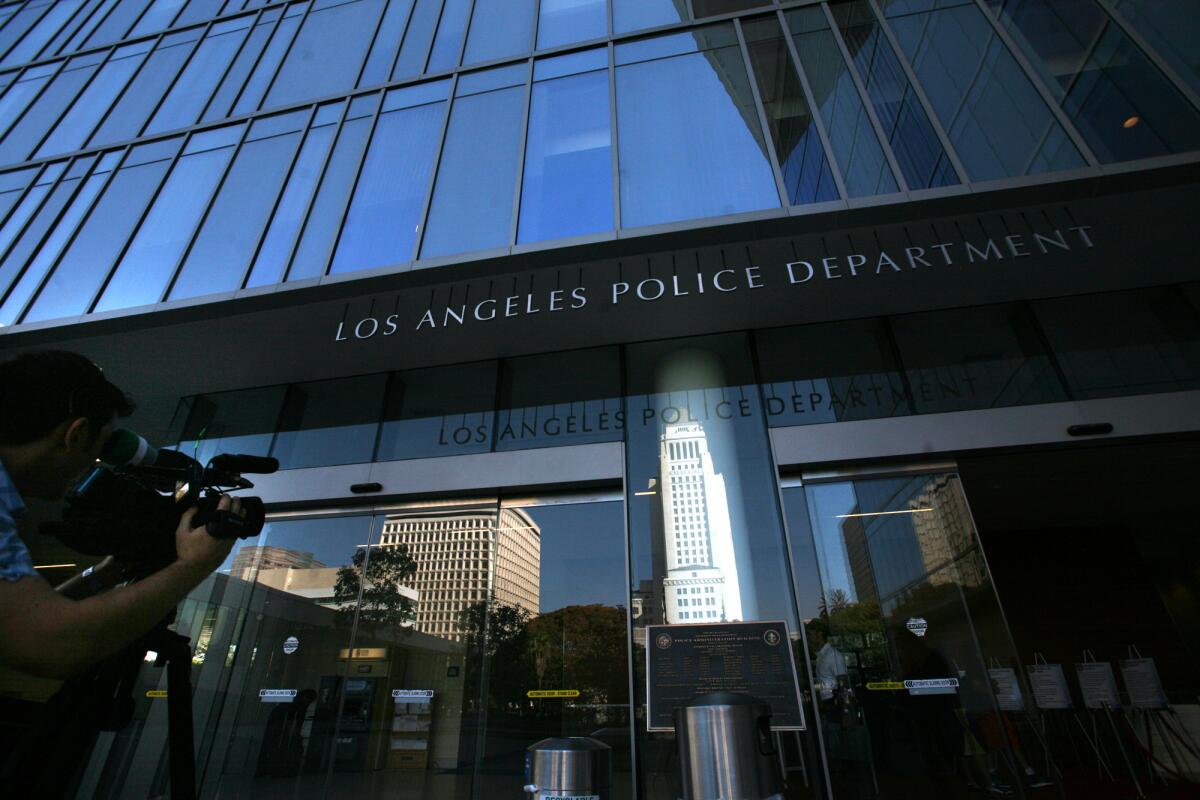Flaws in LAPD’s process for accepting outside donations cited; fixes promised

Los Angeles police officials on Tuesday promised improvements to the LAPD’s process for accepting donations from outside organizations and foundations — which they did to the tune of nearly $10 million last year — after two audits identified issues with documenting and tracking such gifts.
The findings of both reviews were presented to the Police Commission during a virtual meeting Tuesday.
The first, conducted by LAPD Inspector General Mark Smith and his staff, found that the Los Angeles Police Department‘s overall process for accepting gifts was “generally well designed” but that there also were “areas of inconsistency and confusion.”
When outside money came into the department, it wasn’t always clear whether or how it had been solicited by department officials. At times, other basic information — such as who was cutting the checks — wasn’t known or tracked. Some private foundations promised donors special access to LAPD commanders.
The inspector general’s report found the donation process “should be streamlined to facilitate the flow of consistent, accurate information and the timely approval of donations” and provided 10 recommendations for improving the process.
The recommendations included creating standardized forms and a centralized database for gathering and storing critical information about donations, establishing a more structured timeline for seeking donation approval, better tracking information on how donations were obtained, providing more explicit guidelines for employees who solicit donations, establishing more robust policies around potential conflicts of interest and setting parameters for what donors may get in return for their generosity.
Department officials said they accepted all of the recommendations and would begin to implement them. Commission President Eileen Decker said the commission would track that implementation and report on it publicly next year.
“Your recommendations are well taken and will improve our process dramatically, as well as improving the LAPD’s internal process,” Decker told Smith and his staff.
Private foundations have long supplemented the department’s public budget with private donations, funding technology upgrades and equipment, and special community programs. Corporations also make contributions.
The commission must approve donations to the department and can do so independently for gifts of up to about $18,000. Donations of a greater value must also go before the City Council for approval.
In addition to the inspector general’s audit, the commission also discussed a separate, internal audit that outlined the recent discovery by LAPD officials that nearly $350,000 worth of technology, equipment and travel funding from the Los Angeles Police Foundation had been accepted and partially distributed throughout the department without the proper approvals. The foundation is by far the LAPD’s largest donor, providing more than $6 million to the agency just last year.
LAPD Deputy Chief John McMahon, who oversees the department’s information technology bureau, said he instigated the audit after discovering the lack of proper approvals for a raft of Los Angeles Police Foundation gifts. The gifts included laptop computers, office equipment, iPads, video processing software, a three-dimensional scanner, a 50-inch television and various other equipment. There was also funding for travel expenses for department personnel.
The commission approved all of the donations Tuesday, and McMahon said changes had been implemented to prevent the sort of failures that had allowed the items to go into use before approval.
Members of the commission have come under scrutiny from activists in L.A. who say their involvement with nonprofits that contribute or receive funds that flow through the police foundation and the LAPD represents a conflict of interest. Several callers into the virtual meeting Tuesday dismissed the audits for not discussing those connections.
Decker acknowledged the allegations, without suggesting there was any merit to them, and advised all commissioners to run their nonprofit ties past city ethics officials to ensure they have no conflicts and do not give the impression of impropriety. Commissioners have dismissed claims of impropriety in the past, and the criticisms have not diminished interest among officials in receiving gifts — particularly of late.
The audits come at a time of belt-tightening for the LAPD, after a $150-million cut to its multibillion-dollar budget by the City Council this summer and amid ongoing calls by reform activists for a broader defunding of the department.
Last week, LAPD Chief Michel Moore tweeted out a link to a Washington Examiner editorial that criticized calls from activists for outside donors to stop funding police departments and said their efforts undermined police accountability and community programs.
“I echo the sentiment and in the midst of the most challenging economic times in our history, grateful for those who step forward in support of policing. Police foundations should be part of the criminal justice solution,” Moore tweeted.
Moore also exchanged thoughts on outside funding with Commissioner Steve Soboroff this summer, according to emails obtained by The Times through a public records request.
On June 12, Moore sent an email to Soboroff mentioning that the “fiscal crisis” and the “unbudgeted expense” of a large mobilization of officers in response to massive protests in the city had forced the department to switch entirely to compensation time instead of cash overtime payments, because the alternative “was to be unable to make payroll.”
In response, Soboroff suggested that the department may have to “double down” on its reliance on outside giving.
“We [are] gonna have to double down with the foundation for the technology, training and stuff we need to move forward, while at the same time continuing to rethink and reimagine the big picture (like we have been doing),” Soboroff wrote. “I am so concerned about crime rates, rank and file morale, recruitment and retention.”
Soboroff is among the commissioners who have been criticized by activists for what the activists perceive as a conflict of interest related to outside giving — namely for his sitting on the board of the Weingart Foundation, which donates to the police foundation and, therefore, to the LAPD.
On Tuesday, Soboroff said he recuses himself from Weingart votes on such donations and always acts with the best interest of police officers and Los Angeles residents in mind.
He said outside donations to the department are important, particularly now, amid budget cuts.
Soboroff said he isn’t opposed to defunding the part of the police budget that covers operational duties if those duties are shifted to other service providers, but he criticized cuts to the LAPD budget by the city before any such transfer of duties has occurred.
“The idea of taking money away and not being able to have the services provided by someone else is wrong, irresponsible and dangerous for everyone in Los Angeles,” he said.
More to Read
Sign up for Essential California
The most important California stories and recommendations in your inbox every morning.
You may occasionally receive promotional content from the Los Angeles Times.











